Umberto Eco was that rare species of writer, who was knowledgeable about almost anything and everything. He was basically a philosopher and "extracted" his stories from eternal philosophical and scientific aspects that appealed to readers of a certain intellectual level and build on that. This movie is based on his book from 1980 of the same name and it certainly is not one for the casual reader. I read it, or tried to, in 1987 after seeing the movie. But at that time I found it very heavy and long-winding, probably because I had no clue about most of the historical or philosophical aspects. I might add, that I have not read the book since, but are on the outlook for an original hardback copy in my native language, and will take the plunge then. The somewhat surprising success of this medieval fiction, prompted a movie adaptation fairly quickly and Annaud, known for his unconventional "Quest for fire", was chosen to direct it.
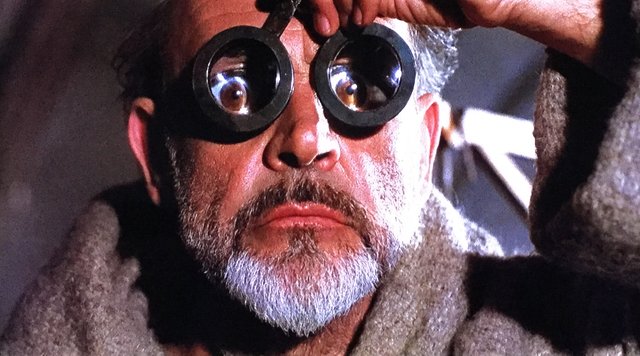
A Franciscan monk, William of Baskerville [Sean Connery] and his apprentice Adso of Melk [Christian Slater], arrive in good time at a desolate Benedictine abbey in northern Italy in 1327, for a big papal debate about Christ´s poverty. As the two of them unpack after a presumably long journey, we are introduced to basically an Aristotelian logically thinking William, who also relies on science, like his measuring instruments and looking glass, as we see him unpack them from his leather bag. Adso seems to be a very young and rather ignorant boy, who feels slightly patronized by his masters razor sharp logic and paternal attitude. The story is basically told as if it was narrated by Adso as an old man recounting his experiences. But it is kept much in the background and only assists in making sure the viewer is steered in the right direction as the somewhat complicated story unfolds.
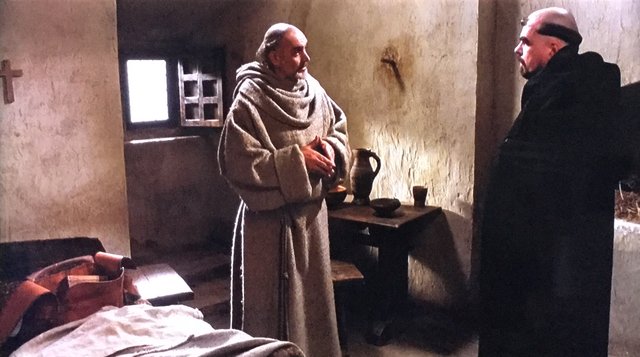
William´s keen eyes soon spot a recently filled grave in the graveyard and when the abbot of the abbey stops by to greet him, his incredible logical reasoning compels the abbot to reveal the story behind the recent death. Or as it is soon revealed, the local beliefs in what happened, which involves "the devil". William agrees to oblige to the abbot´s wishes to look into the case because of his "previous" endeavors as a "prudent" investigator. A clear mind-body dichotomy is thus setup as religion versus reality conflict, with William as the renaissance philosopher fighting against a tsunami of supernatural illusions believed to explain the otherwise logical world of reason.
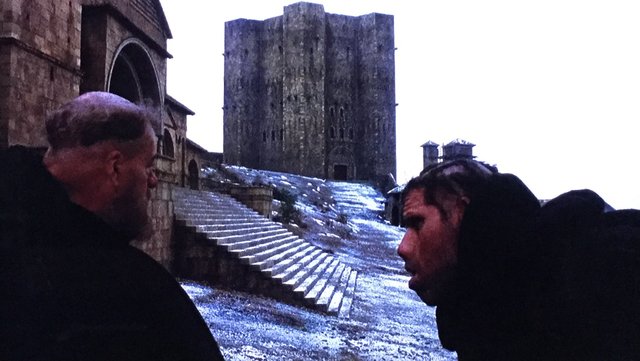
As William and his apprentice start their Sherlock Holmes and Dr. Watson investigation of the mysterious death of the young monk, we are introduced to a host of weird characters who inhabit the abbey and also the poor peasants flocking the outside of the walls scraping around to find some eatable stuff among the garbage "donated" by the church. William quickly reasons his way to a natural explanation of suicide, but as soon as he is able to put it forth, a new murder occurs that can not possibly be explained as suicide. The monks suddenly realize that there is a frightening pattern to the deaths, that matches the prophecy of the apocalypse. Adso also gets acquainted with a rather imbecile hunchback Salvatore [Ron Perlman], who apparently have a past as a herretic Dolcinite. A movement that preached literal poverty in the name of Christ and thus killed wealthy priests and bishops. Furthermore Adso, by accident, is seduced by a beautiful peasant girl, who was supposed to do some sexual favor for Salvatores protector Remigio da Varagine and being the sex-starved teenager he is, he falls in love with the mysterious girl.
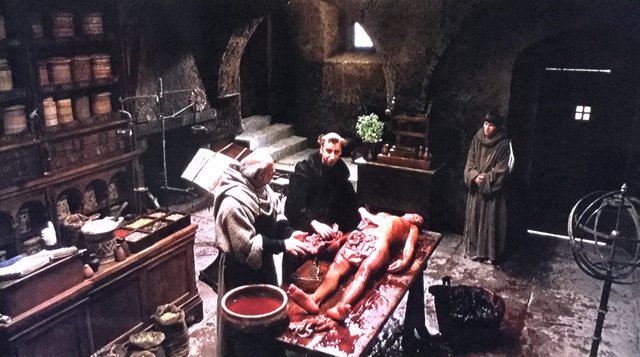
Despite the abbots disappointment that the "crimes" were not solved after all, he lets William keep on investigating in the hope that it still can be solved before the arrival of the important papal delegation that is soon due to arrive for the debate. William finds that the second victim has black fingers and a black tongue. Further more he finds a mysterious parchment in the victims scriptorium desk. After gaining access to the desk secretly at night, the book is stolen by another intruder that ends up dead too the next day. William is alerted and finds the evidence that this third victim is actually the murderer of the second victim. He has now the final solution to the series of murders.
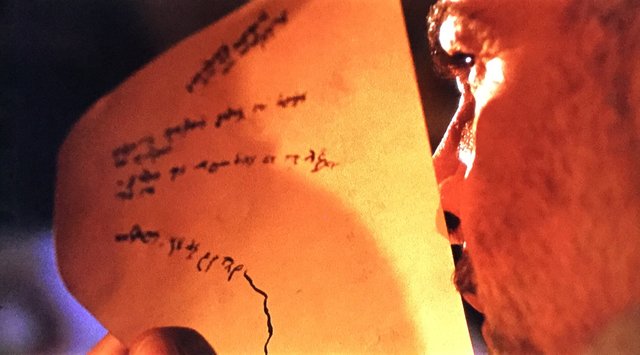
But news arrives as the abbot receives Williams scientific and logical explanation of how the deaths occurred. Along with the papal delegation the feared inquisitor Bernardo Gui [F. Murray Abraham] will arrive and take over further "investigations". William has figured out from several incidents and discussions, that there is a fear of certain books among the leaders of the abbey. The scripture where all the monks work is peculiarly absent of any books or parchments needed for their work. Williams theory is that the tower in which the scriptorium is located is also the home of the library for which the abbey is famous. He believes that this library holds some books for which people will kill and even be killed by, hence the blackened fingers and tongues.
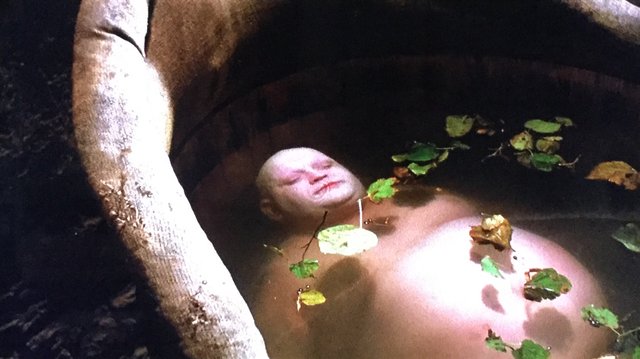
Having come so close to reaching the intellectual satisfaction of solving the mystery, William is set back by the fact that he and Gui have a conflicted history and thus puts him in a difficult position with his "stubborn" will to prove himself right, when the inquisition arrives. While Bernardo arrives, William and Adso has found a backdoor into the library. Armed with the code on the secret parchment from one of the victims, they manage to find a way inside the library. They are unsuccessful in figurering out the final entry into the room that supposedly hold the book that seems to kill. William already have an idea which book this might be as referenced in an earlier episode with venerable Jorge. He is an influential older, blind monk residing in the abbey and apparently he is hell bent on making sure that everyone stay on the beaten path of religious conformity and are not lured away by thought-provoking books, like the second book of poetics, devoted to comedy, by Aristotle, long thought to be lost. William is convinced that the deaths are related this and other philosophical books and that Jorge and his accomplices are the ones trying to keep them hidden away in the tower, while the victims were all trying to get to read them.
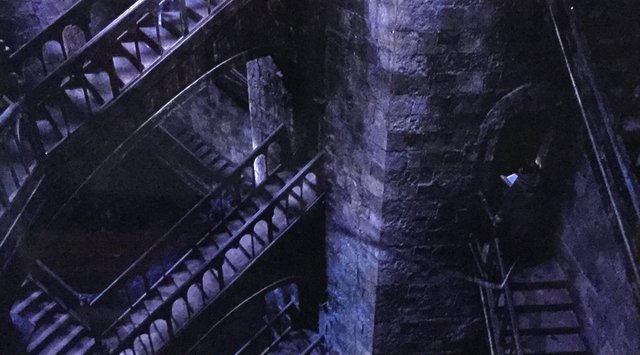
When Bernardo Gui finds Salvatore and the peasant girl in a devilish ceremony with a black cat and a cock, he naturally accuses them of devil worship. Adso is alarmed that his master remains neutral, since he obviously is more than eager to take on a dangerous task when it comes to books. Adso learns that William used to be an inquisitor himself, but lost to Gui in a conflict about a man who translated a Greek book into latin. William was imprisoned and has been living a different life for many years. The herbalist that William helped autopsying the corpses, suddenly finds the book in his laboratory, but he is killed before William can get a hold of it. We learn that the librarian Malachia, close associate to Jorge, is the killer this time.
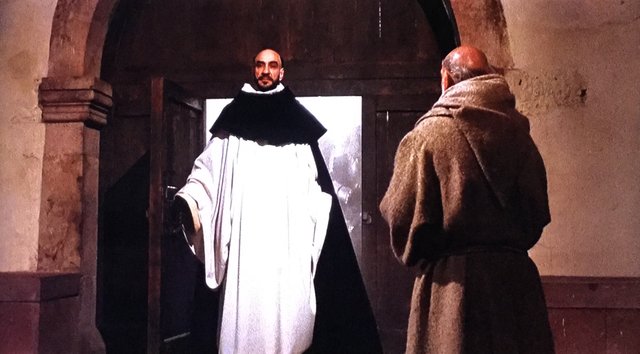
Salvatore is tortured into confession and his protector Remigio is framed into getting caught for escaping and charged with devil-worship too. The three of them are condemned to death by burning at the stake and Bernardo feels secure that he has done his job. But Malachia cannot resist the temptation of the book he secured from the herbalist and during mass he falls over drawing his last breath showing his blackened tongue. William and Adso figured that Malachia just came from the library and they find their way back into the library to look for the book. William have finally broken the code to the secret room in the library and when they get there they find the old venerable Jorge sitting awaiting them with the book. When he hands it over to the stronger William in the hope of him turning the pages that he has poisoned to kill any unaware reader, William puts on gloves and starts reading. Disappointed Jorge manages to escape but later end up tilting over Adso´s lamp and start a fire when he is close to getting captured. The dry old library soon is engulfed in flames and Jorge is catching fire while he eats the poisoned pages from his book one at a time to make sure that it remains out of reach of humanity. From the hill where they are setting fire to the condemned "devil-worshipers", they see the flames start to rise out the top of the tower.
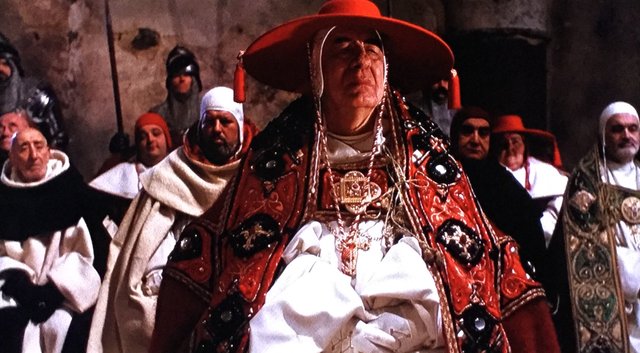
People see this as a sign of dislike of Gui´s judgement from god, and turns against him. he almost manage to escape but the peasants catch up with him and throw him over the cliff to his death. meanwhile the monks hurry back to the abbey to save what can be saved. Adso is luckily close to the exit but William looked cornered by the flames when he left. But miraculously we see William come out of the tower entrance and is embraced by Adso, while he drops the few masterpieces of books he managed to save during escape. The two of them soon leave the abbey behind and the old Adso narrator rounds of the story with the girl that managed to escape the flames, but who´s name he never learned.
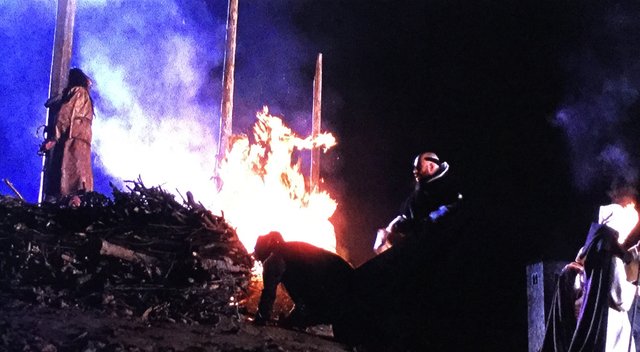
First of all I have to admit that this is one of my all time favorite movies. I have watched it countless times and I find enjoyment in it still. lately I got hold og the Blu-ray version and it is a fantastic joy to finally see it in a quality close to a Theatre experience and with DTS on the home system. I like everything about this one. The story, the plot, the cinematography, the actors, the direction... everything comes together perfectly to create a unique experience. Even the eighties style score is great, or at least not a detraction. In my opinion Connery has his best character here. He always had a notion of doing one off jobs now and then and he just came of a role as a jester-looking Scotchman swinging a huge sword in Highlander, so a medieval detective monk must have felt completely natural to him. The stubborn and intellectual aspects of William fits him surprisingly well. William of Baskerville is based on the english scholastic philosopher William Ockham (famous for "Ockham´s razor) and the stoutness of Connery is a perfect match in my opinion.
Slater is basically a support role and for a while I felt a little disappointed in his performance, and sure, it is not stellar. But on the other hand, his role is a teenage boy who thinks with his dick instead of his head and I think that is quite well portrayed. F. Murray Abraham is a personal favorite of mine and he does not disappoint as the psychopathic Gui. A special mention has to go to Ron Perlman's hunchback, which is quite scary and incredible. His face is already very neandethal looking but here it is turned into a very believable deformed person. And then his mix of languages is hilarious. There is a fantastic cast of mostly freaky looking monks in support roles and the locations and the abbey are really well chosen. You really feel the dampness and coldness come through the screen and smartly it is not made flashy but rather dark and worn instead, which creates a very seductive and fascinating mood. The philosophical aspects are also very interesting and brilliantly interwoven in the story, without becoming lecturing. The period is in the early renaissance and this is also a fascinating time and the start of an avalanche of rationality going on to this day. It gets my highest recommendations.
Rating: 10/10
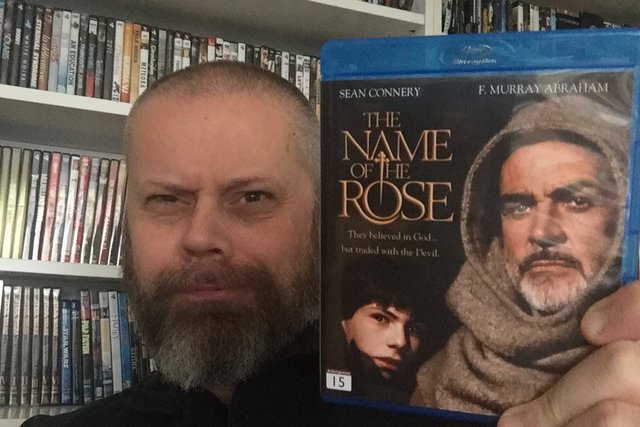

I fell asleep watching it years ago...darn.
Downvoting a post can decrease pending rewards and make it less visible. Common reasons:
Submit
It is not for everyone :-)
Downvoting a post can decrease pending rewards and make it less visible. Common reasons:
Submit
Great movie, one of my favorites! Everybody in it is great...Ron Perlman- one of his best roles. I've seen it panned on Connery fan pages and I think it's one of his best. Imagery is terrific. I could go on all day!
Downvoting a post can decrease pending rewards and make it less visible. Common reasons:
Submit
And awesome book!
Downvoting a post can decrease pending rewards and make it less visible. Common reasons:
Submit
This movie captured my imagination as a child. About ten years ago, I really wanted to see it again so I asked that an HMV store order it from outside for me, thing I never did for any other film. Unfortunately the DVD later got stolen from me and I've not bought it back since.
Haven't read the book, but I've got it along other Umberto Eco books. The only one I read from this author is Foucault's Pendulum which I really enjoyed. I got my hands on it about five years ago, and still as an adult a lot of historical and cultural references eluded me. I like to read equipped with a dictionary and/or google search but even with this usual help of mine, the reading of the book was a long process I feel I could do all over again and still get to learn new things from it.
Downvoting a post can decrease pending rewards and make it less visible. Common reasons:
Submit
Thank you for sharing your experience. This movie has "been with me" for 30 years, so it is one of those specisl ones, no matter how "good" it is objectively
Downvoting a post can decrease pending rewards and make it less visible. Common reasons:
Submit
Interest movie!
Downvoting a post can decrease pending rewards and make it less visible. Common reasons:
Submit